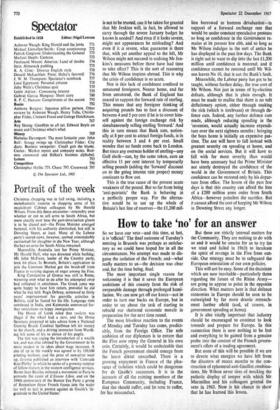How to take 'no' for an answer
So we have our veto—and this time, at last, it is 'official.' The final outcome of Tuesday's meeting in Brussels was perhaps as satisfac- tory as we could have hoped for in all the circumstances. No attempt was made to dis- guise the isolation of the French; and—what really matters to us—the decision was clear and, for the time being, final.
The most important single reason for welcoming it is that it saves the European ambitions of this country from the risk of irreparable damage through prolonged humi- liation. We can now get off our knees—not in- order to turn our backs on Europe, but in order to set about the task of starting to rebuild our shattered economic morale in preparation for the next time round.
The most frivolous reaction to the events of Monday and Tuesday has come, predict- ably, from the Foreign Office. The sole ambition of our diplomats is to ensure that the Five now repay the General in his own coin. Certainly, it would be undesirable that the French government should emerge from the latest diktat unscathed. There is a growing enjoyment in France of the plea- sures of isolation which could be dangerous for de Gaulle's successors. It is in the interests of all the existing members of the European Community, including France, that she should suffer, and be seen to suffer, for her misconduct. But these are strictly internal matters for the Community. They are nothing to do with us and it would be unwise for us to try (as we tried and failed in 1963) to inculcate the spirit of revenge in the Five from out- side. Our strategy must be to safeguard the European orientation of our own policies.
This will not be easy. Some of the decisions which are now inevitable—particularly those regarding the future of the Rhine Army— are going to appear to point in the opposite direction. What matters here is that defence economies in Europe should be seen to be outweighed by far more drastic retrench- ment further afield (and, of course, in government spending at home).
It is also vitally important that industry should be encouraged to continue to look towards and prepare for Europe. In this connection there is now nothing to be lost and everything to be gained from a genuine probe into the content of the French govern- ment's offers of a trading agreement.
But none of this will be possible if we are to devote what energies we have left from the disasters of recent months to the con- struction of ephemeral anti-Gaullist combina- tions. Mr Wilson never tires of mocking the pathetic display of temper with which Mr Macmillan and his colleagues greeted the veto in 1963. Now is his chance to show that he has learned this lesson.


































 Previous page
Previous page